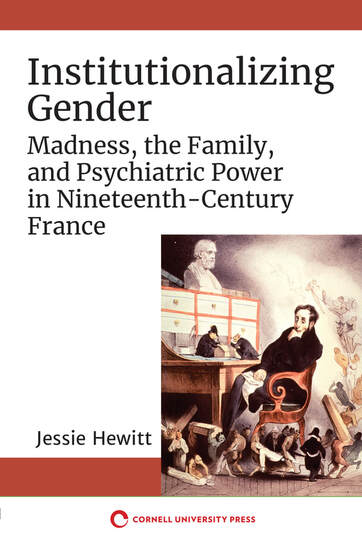
My research program concerns the historical relationship between disability and gender, especially the ways in which normative perceptions of masculinity and femininity shaped the development of the medical professions in nineteenth-century France.
My book, Institutionalizing Gender: Madness, the Family, and Psychiatric Power in Nineteenth-Century France, is available from Cornell University Press as a paperback and an Open Access eBook. This monograph presents a new perspective of the history of the asylum system-- from its optimistic beginnings during the Revolutionary era of the 1790s, to its institutionalization and expansion at mid-century, to the widespread abandonment of the system's core principles by the verge of World War I.
I argue that medical faith in the curability of insanity (and the attendant creation of the asylum system) depended on the elaboration and spread of middle-class family values. Most historians who have analyzed the psychiatric and familial values of this period have focused on the ways in which medical and gender ideologies worked, in tandem, to limit women's opportunities. My work complicates this picture by showing that middle-class gender norms also circumscribed the authority of men and, at times, provided women the chance to exert power themselves.
Asylum doctors' desire to restore rationality by drawing upon patients' assumptions about gendered behavior indicated a newfound belief in the essential humanity of those deemed insane. While doctors' attitudes regarding proper gender comportment were certainly restrictive and often harmful, I argue that the late nineteenth-century abandonment of the use of gender scripts as part of the treatment process indicated a loss of faith in the notion of curability which, in turn, led to an increased stigmatization of madness. By tracing the manipulation of gendered notions such as honor, shame, chivalry, and virtue in the course of doctor-patient interactions, this book contributes to the history of the emotions; the history of disability; the history of medicine; and the history of gender and the family.
I published a related article in French Historical Studies in February 2015. In this piece, entitled "Women Working 'Amidst the Mad': Domesticity as Psychiatric Treatment in Nineteenth-Century Paris," I demonstrate that male doctors’ attempts to replicate familial relations inside asylum walls unintentionally justified the professional aspirations of certain women. Such women, who positioned themselves as maternal figures vis-à-vis their “childlike” patients, reified bourgeois gender norms by linking the enactment of these values to notions of normative mental health. At the same time, they also subverted domestic ideology by performing its tropes in a setting so unlike the typical family home.
Another article, "Married to the 'living dead': madness as a cause for divorce in late nineteenth-century France," was published in Contemporary French Civilization in late 2015. This piece won the Lawrence R. Schehr Memorial Award from the journal's editorial board.
My book, Institutionalizing Gender: Madness, the Family, and Psychiatric Power in Nineteenth-Century France, is available from Cornell University Press as a paperback and an Open Access eBook. This monograph presents a new perspective of the history of the asylum system-- from its optimistic beginnings during the Revolutionary era of the 1790s, to its institutionalization and expansion at mid-century, to the widespread abandonment of the system's core principles by the verge of World War I.
I argue that medical faith in the curability of insanity (and the attendant creation of the asylum system) depended on the elaboration and spread of middle-class family values. Most historians who have analyzed the psychiatric and familial values of this period have focused on the ways in which medical and gender ideologies worked, in tandem, to limit women's opportunities. My work complicates this picture by showing that middle-class gender norms also circumscribed the authority of men and, at times, provided women the chance to exert power themselves.
Asylum doctors' desire to restore rationality by drawing upon patients' assumptions about gendered behavior indicated a newfound belief in the essential humanity of those deemed insane. While doctors' attitudes regarding proper gender comportment were certainly restrictive and often harmful, I argue that the late nineteenth-century abandonment of the use of gender scripts as part of the treatment process indicated a loss of faith in the notion of curability which, in turn, led to an increased stigmatization of madness. By tracing the manipulation of gendered notions such as honor, shame, chivalry, and virtue in the course of doctor-patient interactions, this book contributes to the history of the emotions; the history of disability; the history of medicine; and the history of gender and the family.
I published a related article in French Historical Studies in February 2015. In this piece, entitled "Women Working 'Amidst the Mad': Domesticity as Psychiatric Treatment in Nineteenth-Century Paris," I demonstrate that male doctors’ attempts to replicate familial relations inside asylum walls unintentionally justified the professional aspirations of certain women. Such women, who positioned themselves as maternal figures vis-à-vis their “childlike” patients, reified bourgeois gender norms by linking the enactment of these values to notions of normative mental health. At the same time, they also subverted domestic ideology by performing its tropes in a setting so unlike the typical family home.
Another article, "Married to the 'living dead': madness as a cause for divorce in late nineteenth-century France," was published in Contemporary French Civilization in late 2015. This piece won the Lawrence R. Schehr Memorial Award from the journal's editorial board.
